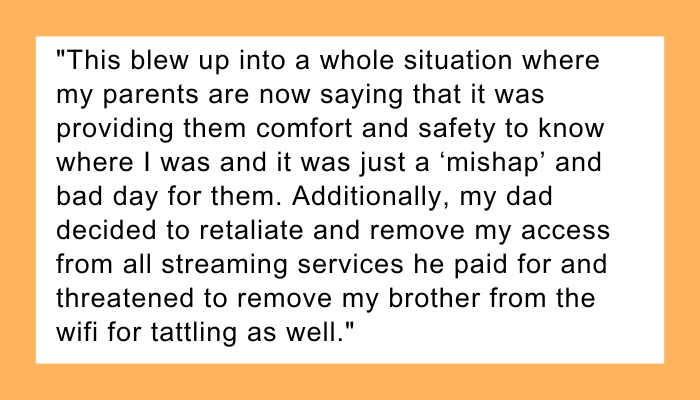Husband Weirded Out Wife’s Parents Track Her Location, She Turns It Off And Causes Family Drama
It’s sadly common for controlling parents to ignore the boundaries of their adult children. Even when their kids are grown, some parents still act like they’re dealing with a six-year-old—wanting to know every detail and control every move.
One woman is now facing this exact issue. She decided to block her parents from tracking her location using a family GPS app. This choice to protect her privacy made her father very upset. Instead of respecting her decision, he became angry and created more problems—dragging her brother into the situation and causing a full-blown family conflict.
Things got so out of hand that the woman turned to the AITAH Reddit community for advice. She’s now wondering if she did something wrong by trying to set healthy boundaries with her toxic family.
This story highlights a growing problem: many adults struggle with emotional abuse and a lack of personal space from their families. It’s important to talk openly about the need for privacy, respect, and mental health, especially when dealing with toxic family dynamics.
Read for more info Reddit
Some parents don’t respect their children’s boundaries
This woman removed her parents’ access to her location, causing major family drama











Parents who disrespect boundaries may have experienced emotional neglect
Trying to control adult children and disrespecting their boundaries may be more than just bad parenting—it can be a sign of deep emotional wounds.
According to psychotherapist Sean Grover, LCSW, this kind of behavior often stems from childhood emotional neglect. In an article for Psychology Today, Grover explains that some parents try to fill the emotional gaps from their past by seeking unconditional love and validation from their children.
“Parents may attach their need for affection, approval, and love to their child,” Grover writes. This often starts when the child is young and fully dependent on the parent. During that time, the parent feels “nourished” or emotionally fulfilled.
But problems begin when the child grows up and starts showing independence. These toxic parents often see their child’s growing individuality as a threat. Instead of adapting, they may respond with guilt-tripping, emotional manipulation, or constant criticism—behaviors that can be extremely harmful.
In situations like the one we mentioned earlier, this can create a damaging parent-child relationship. The child, in turn, may feel ashamed for having personal needs, struggle with low self-esteem, and develop trust issues that affect their adult life.
This is why it’s important to understand the signs of emotional abuse and the importance of mental health in families. Setting emotional boundaries isn’t just healthy—it’s necessary for both personal growth and psychological well-being.
It is better to avoid conflict with parents who lack respect for your boundaries
Parents who don’t respect boundaries often show other toxic behaviors, too. According to licensed social worker and clinical trauma professional Silvi Saxena, this could even be linked to narcissistic personality disorder.
In an article for Choosing Therapy, Saxena explains that the key to dealing with toxic parents is to protect your peace while trying to rebuild the relationship in a healthy way. However, this requires clear and honest communication.
“Toxic parents will often use manipulation, guilt-tripping, or leave out key details to twist the situation in their favor,” Saxena wrote. This behavior is aimed at making you feel bad for setting boundaries or not meeting their expectations.
In the story we discussed, the woman’s parents clearly have trouble respecting her space. And, as Saxena points out, some parents won’t change no matter how hard you try. In such cases, accepting the reality is the first step toward healing. If they continue to cross the line, cutting them off may be necessary for your own mental health and emotional safety.
Allowing this kind of behavior to continue will only enable toxic patterns and create long-term damage.
The woman is now married and building a life of her own. To truly move forward, she might be better off limiting contact or going low-contact with her parents to keep her peace of mind and protect her emotional well-being.
Most people didn’t think she did anything wrong










